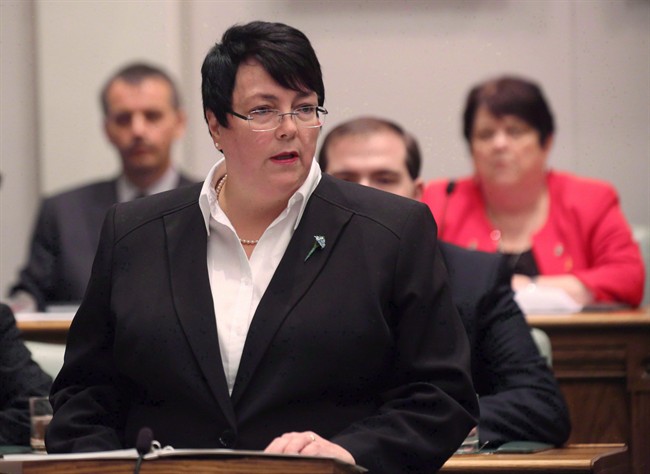Newfoundland and Labrador’s new budget has no tax hikes but projects mounting debt and an almost $800-million deficit as it slightly cuts spending.

READ MORE: Facing $1.8B deficit, Newfoundland and Labrador passes controversial budget
Higher than expected revenues from offshore oil production helped stave off deeper cuts and public-sector job losses.
Finance Minister Cathy Bennett says the province will be in the red for several more years before returning to surplus in 2022-23. The deficit for the last fiscal year was about $1.1 billion, down from $1.8 billion projected last spring.
“We continue to have a spending problem,” Bennett told a news conference Thursday. “We are grateful that oil revenues continue to help us but it simply highlights the fact that we cannot afford the government services we have now with general revenue alone.
“We must continue to reduce spending in the years ahead.”
Still, the $8.1-billion budget will cut an unpopular tax on gasoline by 8.5 cents per litre as of June 1 and another four cents on Dec. 1.
It also says there will be new legislation to freeze wages for public-sector managers and non-union workers. The province recently announced almost 400 management jobs will be eliminated.
READ MORE: Hundreds march in protest of Newfoundland and Labrador budget
Bennett said she anticipates no “massive layoffs” among other staff but bargaining is underway with several union groups.
The budget forecasts net debt will rise by almost $1 billion to $15.2 billion this fiscal year for a population of just 530,000 people.
Bennett concedes it’s a staggering amount that, on a per capita basis, far exceeds other provinces.
“We need to continue to work on lowering the cost of delivering services and lowering the cost of borrowing,” she said.
Bennett said she spoke with the province’s main credit rating agencies prior to the budget and does not expect a repeat of recent downgrades that rack up interest.
The governing Liberals have trimmed almost $500 million in spending since taking office in late 2015, she added. Bennett said those results have come from efficiencies and not diminished government services.
The province has been financially hammered since oil prices collapsed from US$115 a barrel starting in mid-2014. Bennett had counted on an average oil price of about US$45 for the last fiscal year but prices were slightly higher.
Brent crude was trading early Thursday at about US$54 a barrel.
Higher prices and production put just over $962 million into provincial coffers last year, almost double what was forecast. Almost $882 million in offshore royalties are expected this year.
Bennett has anchored this year’s budget on an average oil price of US$56 a barrel, drawing on 30 forecast reports.
She has also asked Crown corporation Nalcor Energy to find savings to set aside $210 million to help lower electricity rates starting in 2020-21.
READ MORE: Tough N.L. budget has steep tax hikes, deep job cuts to tackle $1.8B deficit
The $12-billion Muskrat Falls hydroelectric project in Labrador, which is over budget and delayed, is expected to add as much as $150 a month to an average heating bill when it comes online in about three years.
The province has borrowed $4.9 billion since 2016 to get through a funding crunch caused by over-reliance on once-lucrative offshore oil earnings, Bennett said. Borrowing will be down to $400 million this year, she added.
“I’m confident that the work we’re doing is getting us on the right track.”



Comments